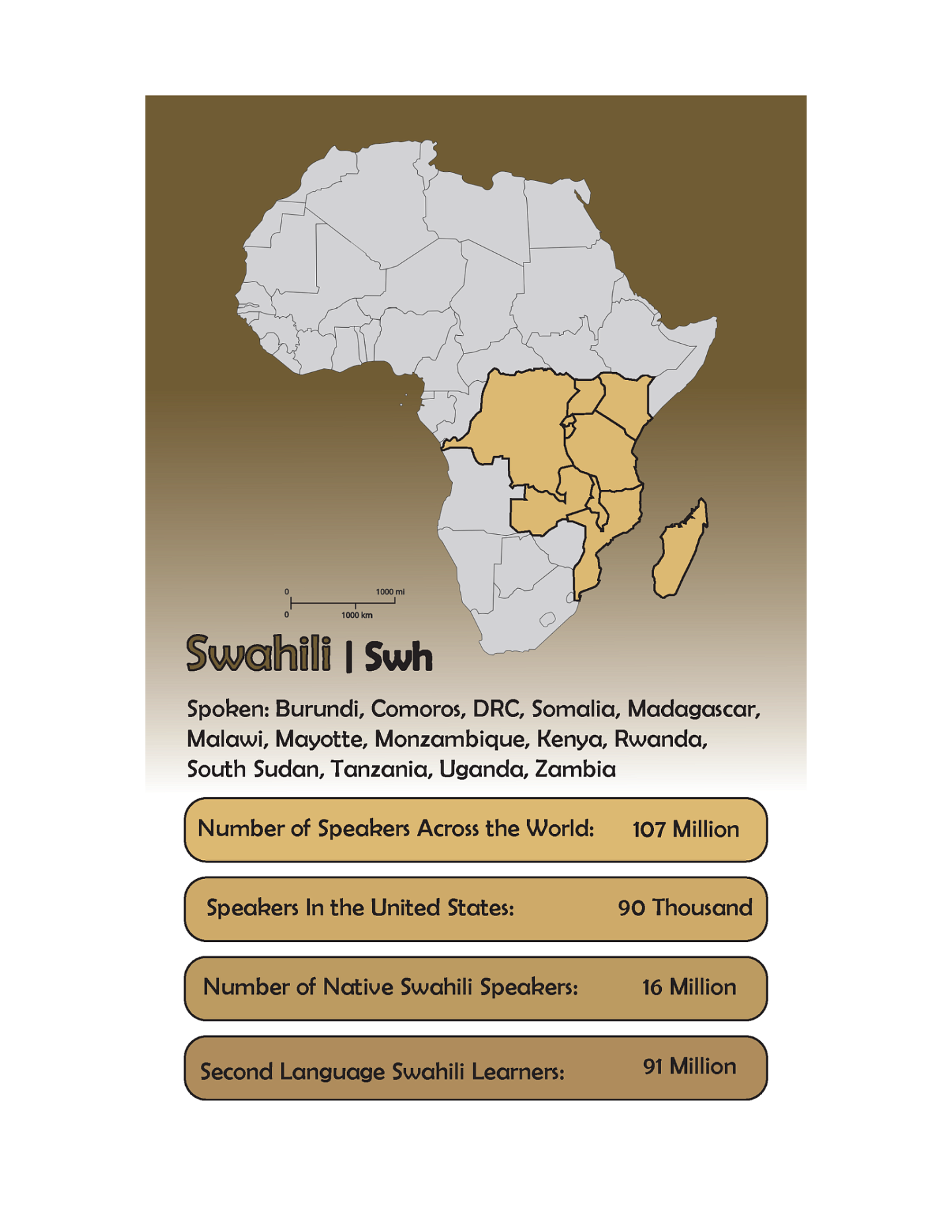
Academic Team:
Mokaya Bosire (mokaya@uoregon.edu)
FIG Seminar Instructor
Rocio
FIG Assistant
Meet your FIG Instructor and Assistant!
Curious about how common Swahili is? Check out this map showing some of the countries where Swahili is a main language!

Courses in the FIG:
UGST 109 FIG Seminar
Monday | 16:00-16:50 | STB 151 | 16337 | 1 Credit
This FIG takes you on a journey of contemporary issues affecting Africa through the lens of the Swahili culture, peoples, and language. Students get to examine issues like development, lingering effects of colonialism, climate change and experience the breath-taking culture of the Swahili Nation [food, music, pop culture]. Students will experience the behind-the-scenes of Africa and answer questions like: What is a day like in Africa? What is the worldview of the Swahili Nation and what do they consider development?
Through multi-media content, guest presentations and other out of class activities, students get to experience Swahili culture and interact with Swahili community on and off campus. Students get to cook and savor a delicious Swahili dish with native Swahili speakers.
In Swahili, a safari is a journey. Join us on this FIG Safari – where a fun fall term can lead to incredible study abroad opportunities for you. Karibuni!
GLBL 101 Introduction to Global Issues
Social Science (>2) | >GP | Monday/Wednesday | 10:00-11:20 | 221 ALL |12320 | 4 Credits
+Dis | Friday | 11:00-11:50 | 16 PAC | 16148
Hunger, intellectual property, global warming, arms trade, water rights, resource depletion, civil war, genocide, biodiversity loss, terrorism, education, global financial inequities, and immigration: These a just a few examples of the sometimes overwhelming list of challenges we face in a highly globalized world. Some are new but most have been with us for thousands of years. What have changed significantly and rapidly are our mobility and our access to information and images. Issues which a few decades ago may have seemed distant and disconnected are now thrust upon us or at least accessible through various media. Among the wide range of problems and issues faced by people throughout the world, who decides which issues get priority and attention? What informs your own sense of compassion and focus? Does our heightened sense of connection move us more quickly to resolution or to greater cynicism?
The course is designed to meet the social science group-satisfying general education requirement. As the syllabus demonstrates, GLBL 101 covers a cross-section of issues, perspectives and scholarly modes of analysis by those working in the field of international studies. The course subject matter is broad, covering issues such as hunger, intellectual property, global warming, arms trade, water rights, resource depletion, civil war, genocide, biodiversity loss, terrorism, education, global financial inequities, and immigration. The course is grounded in the social sciences with readings and lecture material largely informed by the fields of human geography, sociology, political science, and social psychology. The course compels students to consider ways in which current international issues are framed by popular media, various stakeholders, and academicians (from the social sciences).
FLR 225 Voices of Africa
Arts & Letters (>1)| >GP | Tuesday/Thursday | 16:00-17:20 | 117 ED | 12166 | 4 Credits
+Dis | Friday | 10:00-10:50 | 240C MCK | 12168
This course introduces students to the diversity and vivacity of life in African contexts through engagement with a variety of voices from across the continent. Many courses about Africa at UO tend to emphasize critical issues impacting African peoples, contributing to many students knowing little about life in Africa other than that there are social problems. The focus of this course is different in its emphasis on the daily lives and expressivity and creativity of people living in a wide variety of social, cultural, economic, and political contexts on the continent. For this course, a "voice" refers to any kind of communicative act, including stories, novels, poetry, cartoons, personal experience narratives, journalistic writings, songs, music, dance, film, political oratory, dress, blogs, websites, paintings, pottery, interviews, body art, and so on. As students engage with voices from Africa, they will consider the people and contexts involved in its production and reception as well as the ways in which it communicates and functions in order to gain insight into the lives, experiences, and expressivity of individuals and communities. The syllabus is designed to engage with many different types of people from different countries, economic standards, gender, values, ages, political perspectives. Important themes for the course include creativity, expressivity, identity, family, community, language, gender, class, ethnicity, education, oppression, resistance, religion, politics, colonialism, neo-colonialism, and globalization. This course satisfies the International Cultures multicultural requirement by providing a critical perspective about intersections between individuals, cultures, and identities in specific African contexts. Students will learn about how people belonging to specific socio-cultural categories (e.g. related to nationality, ethnicity, class, gender, and occupation) use expressive forms in the construction of identities and in the negotiation of power dynamics. Issues related to colonialism, post‐colonialism, relationships between ethnic groups, wars, gender, class, globalization, labor, migration, and democratization will emerge as we consider the multiple ways that expressive forms emerge, transform, and function within situated contexts. This course also satisfies the Arts and Letters group requirement, because it introduces students to modes of inquiry central to the discipline of folklore studies. Students will be introduces to a wide range of perspectives and theoretical approaches to the study of folklore, including theories of culture, creativity, narrative, genre, identity, ethnicity, and gender, as these apply to the study of the cultural expressions of contemporary African people.
